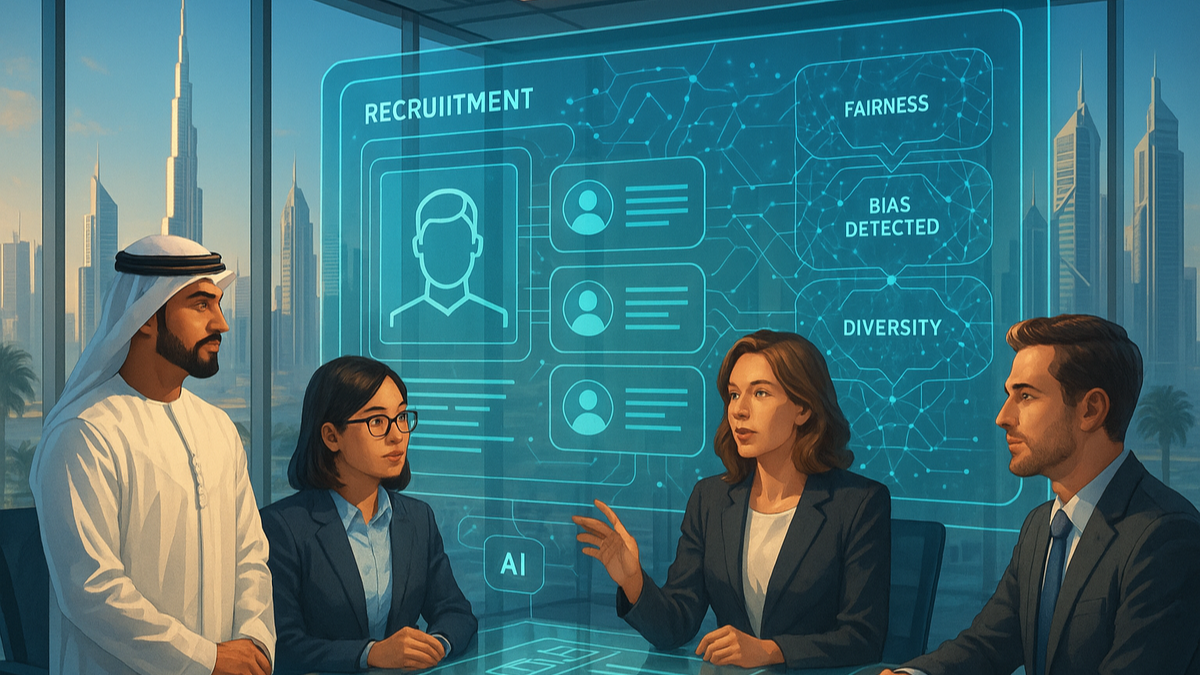Ethical AI in Recruitment 2026: The recruitment landscape in the UAE is undergoing a revolutionary transformation. As we approach 2026, ethical AI in recruitment has evolved from a buzzword to a critical compliance requirement that every organisation must address. At Mahad Manpower UAE, we’ve witnessed firsthand how artificial intelligence is reshaping hiring practices across the Emirates, bringing both unprecedented opportunities and complex ethical challenges.
Ethical AI in Recruitment 2026: Are Your Practices Compliant?
The Current State of AI in UAE Recruitment
Ethical AI in Recruitment 2026: Today’s recruitment ecosystem in the UAE heavily relies on AI-powered tools for resume screening, candidate matching, and initial assessments. Major corporations across Dubai, Abu Dhabi, and other emirates are leveraging these technologies to process thousands of applications efficiently. However, as AI adoption accelerates, so does the scrutiny around Ethical AI in Recruitment 2026 standards and practices. AI in recruitment 2026 trends.
Ethical AI in Recruitment 2026: The UAE government’s commitment to becoming a global AI hub by 2031 has intensified focus on responsible AI implementation. Recent regulatory frameworks emphasise that while efficiency is important, ethical considerations must take precedence in automated hiring decisions.
Key Ethical Challenges in AI-Driven Recruitment
1. Algorithmic Bias and Discrimination
One of the most pressing concerns in Ethical AI in Recruitment 2026 is algorithmic bias. AI systems can inadvertently perpetuate historical biases present in training data, potentially discriminating against candidates based on gender, nationality, age, or educational background. In the UAE’s diverse workforce, where over 200 nationalities coexist, eliminating such biases is crucial for fair hiring practices.
2. Transparency and Explainability
Candidates have the right to understand how AI systems evaluate their applications. The “black box” nature of many AI algorithms poses challenges for transparency. Organisations must ensure their AI tools can explain decision-making processes in clear, understandable terms.
3. Data Privacy and Security
With the UAE’s stringent data protection laws, managing candidate information ethically is paramount. AI systems process vast amounts of personal data, including biometric information from video interviews. Ensuring GDPR compliance and adhering to local data protection regulations is non-negotiable.
Compliance Framework for Ethical AI in Recruitment 2026
UAE Regulatory Landscape
The UAE has introduced comprehensive guidelines for AI ethics, including: Guidelines shape future recruitment technology.
- The UAE National AI Strategy 2031
- Dubai’s AI Ethics Guidelines
- Federal Data Protection Law
These frameworks mandate that organisations using AI in recruitment must:
- Conduct regular bias audits
- Maintain transparent AI decision-making processes
- Ensure data minimization and purpose limitation
- Provide human oversight for all AI-driven decisions
International Standards
Beyond local regulations, UAE companies must also consider international standards such as:
- ISO/IEC 23053:2022 for AI trustworthiness
- EU AI Act implications for multinational corporations
- IEEE standards for algorithmic bias assessment
Best Practices for Ethical AI Implementation
1. Diverse Training Data
Ensure your AI systems are trained on diverse, representative datasets that reflect the UAE’s multicultural workforce. Regular updates to training data help prevent bias amplification.
2. Human-in-the-Loop Systems
Implement hybrid models where AI assists human recruiters rather than replacing them entirely. This approach ensures ethical oversight while maintaining efficiency.
3. Regular Auditing and Testing
Conduct quarterly bias audits and fairness assessments. Test your AI systems across different demographic groups to identify potential discriminatory patterns.
4. Clear Communication
Be transparent with candidates about AI usage in your recruitment process. Provide clear information about data usage, storage, and candidate rights.
5. Continuous Monitoring
Establish KPIs for ethical AI performance, including: AI recruiting laws.
- Diversity metrics in shortlisted candidates
- False positive/negative rates across demographics
- Candidate satisfaction scores
- Time-to-hire without compromising fairness
The Road Ahead: Preparing for 2026
As we move toward 2026, ethical AI in recruitment will become even more sophisticated and regulated. Organisations must start preparing now by:
- Investing in Ethical AI Training: Ensure your HR teams understand AI ethics and compliance requirements.
- Partnering with Ethical AI Vendors: Choose technology partners committed to fairness and transparency.
- Building Internal Guidelines: Develop comprehensive AI ethics policies aligned with UAE regulations.
- Creating Feedback Mechanisms: Establish channels for candidates to report concerns about AI-driven processes.
Conclusion
Ethical AI in Recruitment 2026 is not just about compliance it’s about building trust, ensuring fairness, and creating inclusive workplaces that reflect the UAE’s values of diversity and innovation. At Mahad Manpower UAE, we believe that ethical AI implementation is a competitive advantage that attracts top talent while maintaining the highest standards of fairness and transparency.
As the recruitment landscape continues to evolve, organisations that prioritise ethical AI practices today will be the employers of choice tomorrow. The question isn’t whether to adopt AI in recruitment, but how to do so ethically, responsibly, and in full compliance with emerging regulations.
Is your organisation ready for the ethical AI standards of 2026? The time to act is now.

